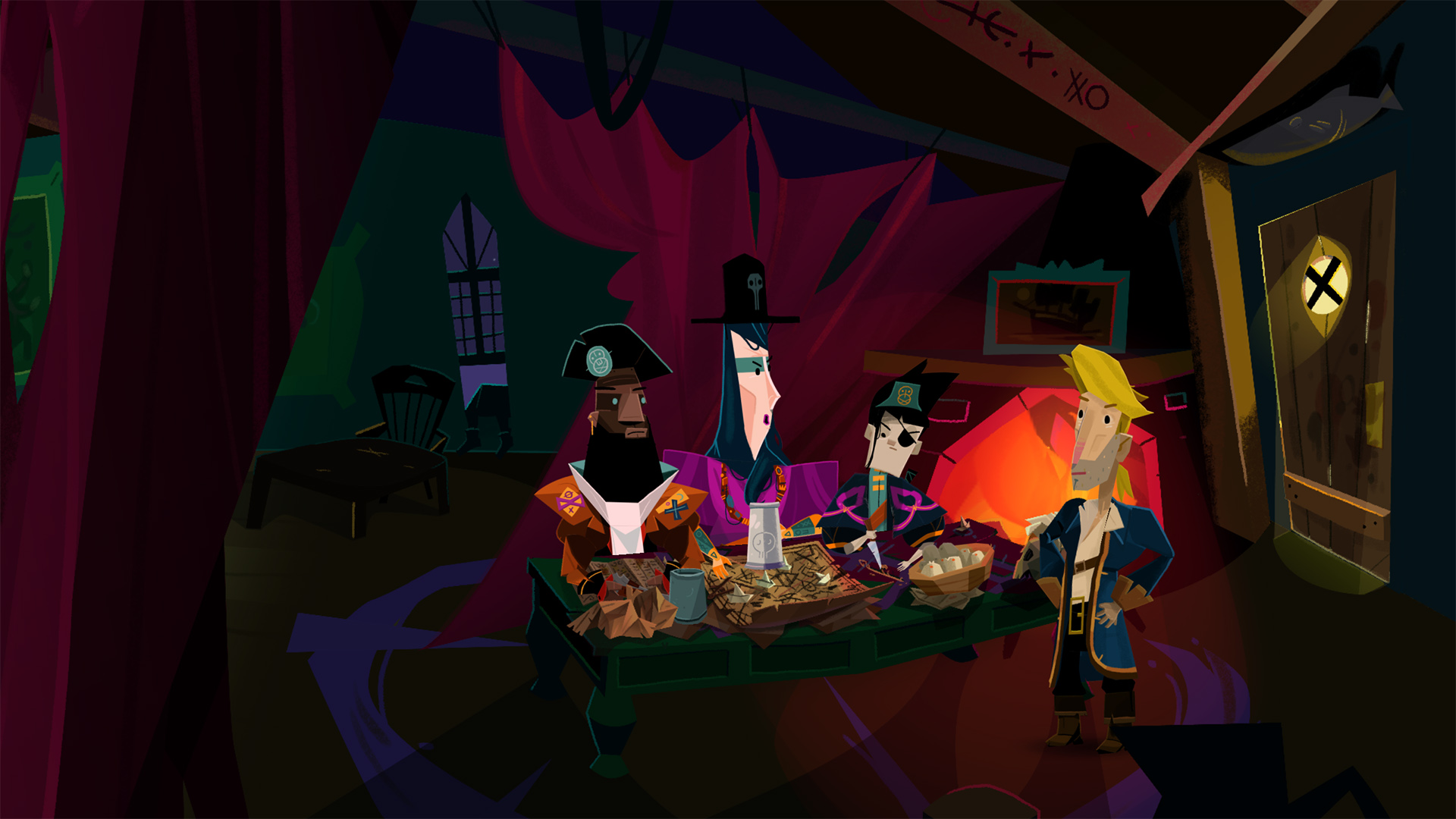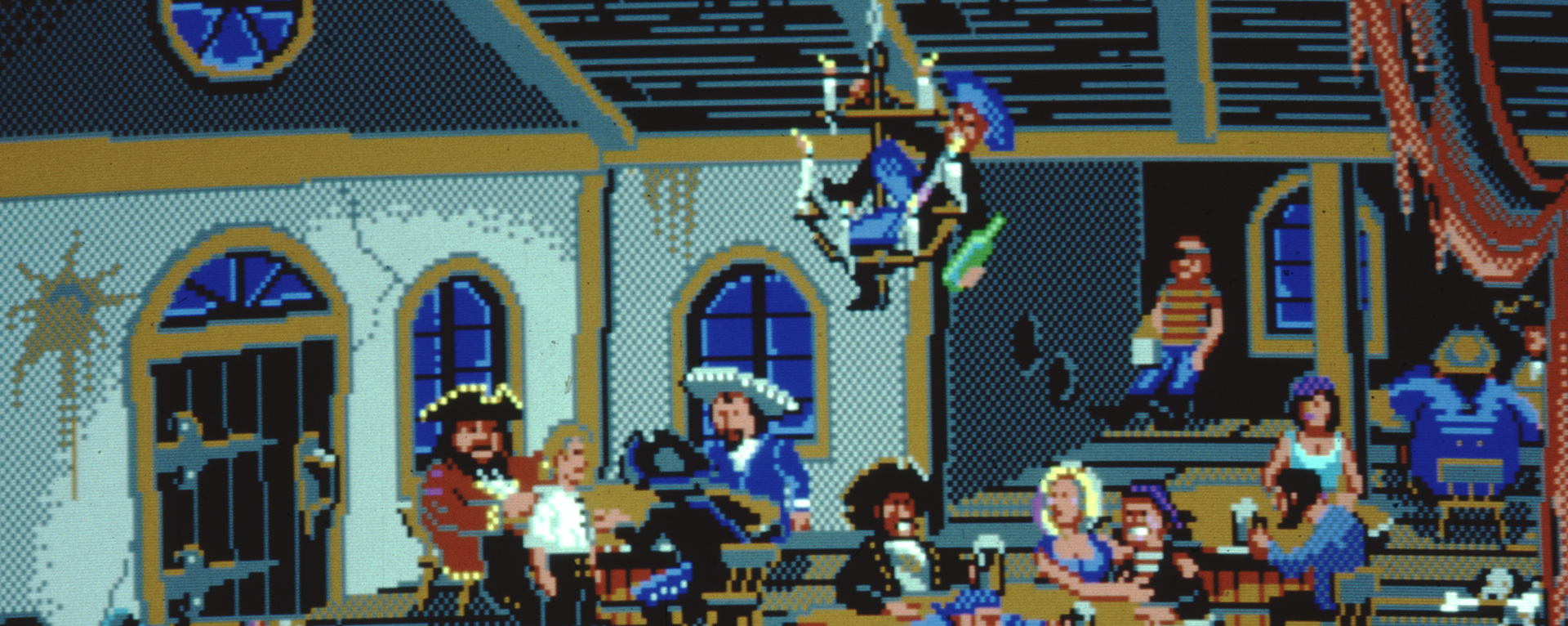Defining Moments: The SCUMM Bar
A Wannabe Pirate Takes His First Steps Into a Larger World
“Hi! My name’s Guybrush Threepwood and I want to be a pirate!” So begins one of Lucasfilm’s most beloved adventure stories. It first appeared on the home computer screen as Lucasfilm Games’ 1990 hit The Secret of Monkey Island. With the latest entry in the fabled series, Return to Monkey Island, premiering this week, it seems poignant to examine the opening of that first adventure set deep in the Caribbean.
As the main character controlled by the game player, the young, headstrong Guybrush Threepwood finds himself on Mêlée Island, a favorite pirate haunt full of rugged terrain and more than one quirky inhabitant. Introducing himself to the island’s lookout high atop a mountain peak, Guybrush is directed down to the waterline where the so-called pirate leaders will greet him at the SCUMM Bar. Visiting the establishment is the player’s first task.
At a small coastal village of rickety wooden shacks, Guybrush enters the pirate hangout with the odd name. It’s full of swashbucklers in varying states of lunacy. One even hangs from a chandelier made from an old ship’s anchor. Speaking to the patrons brings little clarity to the hilarious scene. One laughs at Guybrush’s bizarre name, only to share that his own is “Mancomb Seepgood.” Another seems preoccupied with advertising an entirely different computer game, Loom, which just so happened to be released by Lucasfilm Games that same year. Yet Guybrush does manage to gather vague details about strange happenings involving the island’s Governor and a mysterious, ghostly villain.
This alluring, slightly threatening scene is the hero’s introduction to the pirate’s life, and the so-called pirate leaders at the back of the SCUMM Bar provide Guybrush with three trials to prove his worth.
The laughable irony of the scenario is that the pirates are too frightened to actually venture out on the seas and go pirating themselves. The frightful actions of the ghost pirate LeChuck and his undead crew have sent them running into the safety of the SCUMM Bar where they seem more interested in drinking large quantities of grog than doing anything about the antagonist’s threats. With his innocent dreams of fortune and glory, only Guybrush seems willing to assemble a crew, buy a ship, and set out to rescue the kidnapped Governor Elaine Marley, and perhaps even discover the fabled secret of Monkey Island.
Inspirations abound in this seedy den of cutthroats. Tim Powers’ 1987 novel On Stranger Tides was an important influence for the game’s creator, Ron Gilbert, and early on its main character Jack Shandy visits the pirate-infested Caribbean island of New Providence where most of the inhabitants seem preoccupied with eating and carousing. In addition, there is resemblance to the Admiral Benbow Inn where young Jim Hawkins first encounters nefarious swashbucklers in a much older work of pirate fiction, Robert Louis Stevenson’s Treasure Island.
There’s also a flavor of Disneyland’s Pirates of the Caribbean attraction, another early piece of source material for Gilbert. Walt Disney and his team of Imagineers envisioned a journey where park guests float through scenes already in-progress as pirates go about their pillaging and plundering. Guybrush’s experience of popping in and out of different conversations with the denizens of the SCUMM Bar has a reminiscent feel.
The distinctive name itself has a unique source. Lucasfilm Games’ point-and-click adventure titles of the period were created using an innovative game engine known as “SCUMM.” First developed by Gilbert and team for the 1987 game Maniac Mansion, the acronym stood for “Script Creation Utility for Maniac Mansion.” Most players of Monkey Island were likely unaware of the reasoning behind the bar’s unusual spelling choice.
The SCUMM Bar has similarities with other Lucasfilm stories as well. In Star Wars: A New Hope, Obi-Wan Kenobi introduces Luke Skywalker to the settlement of Mos Eisley, describing the spaceport as a “wretched hive of scum and villainy.” The dusty cantina they visit lives up to the Jedi’s blunt description. At an early stage in the journey depicted in Willow, the small but courageous Willow Ufgood carries the baby Elora Danan into a foreboding tavern full of human-sized Daikini. He finds no one caring enough to help him, and some are even openly hostile. And of course, we can all remember more than one instance when Indiana Jones wanders into a local watering hole.
All of these moments are examples of “crossing the threshold,” a phrase coined by mythologist Joseph Campbell (a friend and important influence on George Lucas) in his discussion of the mythical hero’s journey. Campbell illuminated how this story structure is common to ancient myths and legends from around the world. This crossing from the familiar safety of one’s home into the strange and dangerous wider world marks the start of an adventure.
It’s only fitting that as players ready themselves to return to the world of the Monkey Island stories, or perhaps try their hand at them for the first time, the SCUMM Bar will be present, as it was over 30 years ago, to help set the stage.
—

Lucas O. Seastrom is a writer and historian at Lucasfilm.

